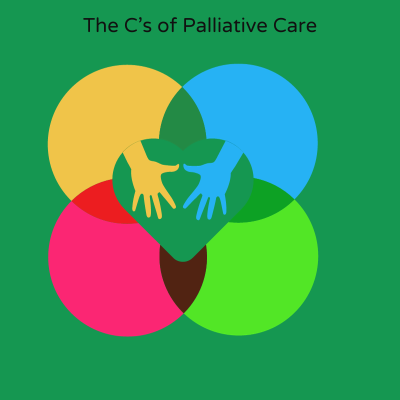The Five C’s of Palliative Care

Palliative care helps people live their best life despite a serious illness. Worldwide, though, people are denied this, both because of lack of access as well as a lack of understanding about what it has to offer. Let’s try to change that, shall we?
Palliative care is an approach to healthcare that treats symptoms associated with serious illnesses and offers physical, social, and psychological support. Anyone with a serious illness or condition like cancer, heart disease, Parkinson’s, spinal cord trauma, and so on can and should avail of the benefits of palliative care right from the time of diagnosis.
Five crucial aspects of palliative care – often which we could refer to as five Cs – make it invaluable to patients and their families.
Competent Care
Palliative care requires competency-based training and meticulous attention from each interdisciplinary team member to effectively address all areas of distress, from medical to social, emotional, and spiritual. because of its multi-pronged approach that considers various factors that interplay and affect the overall quality of life, palliative care often addresses domains that are otherwise overlooked. In doing so, the care received by the family is holistic.
Control Of Symptoms
Symptoms like nausea, breathlessness, constipation, etc, drastically decrease the quality of life of patients. By bringing these symptoms under manageable control and enabling family caregivers to participate in non-pharmacological interventions, hospital visits can be brought down, thus also reducing the financial toxicity of illness.
Collaboration With Caregivers and Recipients
Palliative care values collaboration. With the patient, ensure that they are heard. Secondly, the patient’s existing medical team provides an extra layer of support to an ongoing curative treatment. With a patient’s family to educate them about the situation and available options, allowing them to make active to empower them through a shared decision-making process, and set goals that are aligned with their values, preferences, and capacity.
Compassionate Communication
Communication is a skill required by all healthcare providers, and palliative care places great importance on it. Clarity of information being shared, understanding the patient’s perception of their illness status, navigating difficult conversations along the trajectory and asisting the family to make difficult choices, especially towards end of life are part of the skill set. Palliative care teams also attempt to foster better communication between patients and their families and community to help them overcome some of the mental stressors that accompany illnesses.
Community Involvement
Universal health coverage talks about the importance of including communities in the design and delivery of healthcare. In resource crunched settings in across the world, access to tertiary level care is not available. The community becomes a vital bridge to overcome gaps. This particular aspect has been modelled with success in teh state of Kerala, and variations of this model serve to reduce the access gap in different communities. Individuals from Community volunteer groups visit and assist patients, organize programs that bring people together, provide practical and emotional support and often become advocates to the local government and social agencies to improve conditions so that patients may have better care.
Pallium India has several programs, like Compassionate Communities and Students’ Initiative in Palliative Care, to engage the community and make them a part of the palliative care process.






